- Home
- Linda Byler
Christmas Visitor Page 5
Christmas Visitor Read online
Page 5
Esther set the table, adding salt and pepper, ketchup, butter, and strawberry jelly to the spread with plates, knives, and forks. There was no orange juice, and grapes had been too expensive to can juice, so they drank cold water for their lunch on fasht dag.
When Ruth bowed her head before they ate, she remembered to thank God especially for the gift of one thousand dollars that had come with the early morning mail delivery.
The cornmeal mush was delicious. The boys devoured every last slice and ate two eggs each and all the buttered toast they could hold.
Esther didn’t like mush, so she wrinkled her nose and said it was greasy and disgusting. Elmer said that was great if she didn’t eat it so he’d have more. Roy nodded his head in agreement, his straight brown hair sliding back and forth with each movement.
Esther said just doddies (grandfathers) and mommies ate mush. Roy said they did not either. Anyone could eat mush if they felt like it.
Esther said rich people ate bacon, and Elmer said they were rich. Roy nodded his head again. Esther looked at Ruth and said, “Right, Mam, we’re not rich?”
“We are rich, Esther. We have each other and God takes very good care of us.”
After that wonderful fasht dag, the coal bin was filled with three tons of coal, the gas bill was paid, and Ruth planned to go Christmas shopping with Mamie.
A few days before the shopping trip, the boys hitched Oatmeal to the cart and went back to the farm for two gallons of milk. It was a gray sort of day, chilly and overcast with the clouds bulging with rain that hadn’t started to fall. Elmer said later that was why he didn’t see the oncoming truck—it was gray, too.
Ruth saw the whole thing from the kitchen window and clutched Benjamin with one hand as she clapped the other across her mouth to stifle a scream. She was completely helpless as she watched Elmer pull out directly in front of a pickup truck. She saw him come down hard with the leather reins on the pony’s haunches, scaring poor Oatmeal out of her wits. The driver also hit the brakes, and Oatmeal lunged forward, spilling both boys out onto the road.
Roy came screaming and crying, completely beside himself with pain and fear and holding his left wrist with his right hand. Ruth laid crying Benjy into his playpen and asked Esther to watch him, please. She’d be back.
The driver of the truck was middle aged, lean, and sensible but most definitely shaken up and unhappy with his circumstances at that moment. Elmer was running down the road after his surprised pony, Roy was yelling senselessly, and some very black tire marks stretched along Hoosier Road. But thank God, no one was seriously injured.
The driver’s name was Dan Rogers, and he offered to call the police, although his truck wasn’t damaged. Ruth grasped her sweater at the waistline and shivered as her teeth chattered. She told him it was fine, she’d have the wrist checked by their family doctor.
Dan stayed long enough to watch Roy spread his fingers, lift and lower his hand, and rotate his wrist. Then he waited until Elmer returned with Oatmeal and the cart, apparently unharmed, although Elmer had telltale streaks of gray where he’d wiped fiercely at his little boy tears.
Ruth hugged both boys together, gathering them close in a thankful embrace. That night she spent a very restless night as Roy woke up continually, calling for his mother because of the pain.
In the morning, resignedly, she took Roy to Intercourse to Doctor Pfieffer, who did a quick diagnosis and said it was only a bad sprain as the x-ray showed no fracture. He put a splint on the wrist and wrapped it over and over.
Ruth wrote out a check for two hundred and fifteen dollars, signed her name, and took Roy home again. She settled him on the couch with a few books and then took Benjamin and walked down the road to Mamie’s house. Ruth knocked on the front door and was greeted by the usual insane yipping of Mamie’s brown Pomeranian.
Mamie opened the door, a men’s handkerchief of a questionable cleanliness tied around her head, a torn bib apron sliding off one shoulder, and Waynie, as usual, stuck on one hip like a permanent fixture.
“I don’t know why you think you always have to knock,” she said as her way of greeting Ruth.
“It’s polite, Mamie.”
“Who’s polite? What is that? Here, give me your precious bundle. Waynie, go play now. Trixie, shoo. Gay! (Go!) Waynie, Trixie!”
Waynie sat down and howled. Trixie continued yipping, and Benjamin’s eyes grew very wide and uncertain.
“Ach my! My house is a total circus. Johnny, come get Trixie. Put her in the kesslehaus. Fannie, come get Waynie. Susan, where’s Fannie? Well, here, Susan, give him a graham cracker in his high chair. Trixie! Johnny! Come get this dog!”
Ruth couldn’t stop smiling, the warmth spreading through her like bright, summer sunshine. She loved Mamie so much she wanted to send her a card with a funny saying about friends or a bouquet of flowers, but as it was, she knew she could afford neither, so she unwrapped Benjamin and handed him to an eager Fannie. She was Mamie’s oldest daughter, tall and slim, with a splattering of freckles and brown eyes. She had magically appeared after Susan, her younger blonde-haired sister, had taken away the wailing Waynie.
“He’s teething,” Mamie sighed.
“Poor Waynie, he looks unhappy.”
“He is.”
“Well, Mamie, I came to tell you that I’ll have to back out of the shopping trip. The boys had a near accident yesterday, pulling out in front of a pickup with Oatmeal, and I had to have Roy’s wrist taken care of.”
“Oh no! Are they okay?”
“Yes, just a bad sprain in Roy’s left wrist.”
“Well, good, but it really spites me you can’t go with us. Do you want me to give you some money? Of course, I better not say that. Eph would have a fit. He can hardly get forty hours in down at the shed place, this time of year. Trixie!”
Mamie got up and lumbered after the tiny Pomeranian. Ruth had to wonder what kept the dog alive, being underfoot all the time.
“I don’t know where that Johnny is. Now, as we were saying, if you can’t go, will you be able to have Christmas gifts this year? Ach Ruth, I simply pity you so bad. I’m going to tell Davey that you’re out of money.”
“No! Mamie please. Our deacon has enough to think about.”
“You want coffee?”
“No, I have to get back. Roy might need me.”
Ruth glanced around, trying not to notice the piles of dirty dishes, the messy stove top, the fly hanger above the table dotted with dead houseflies—not to mention the clutter all over the floor.
“Stop looking at my house.”
Ruth laughed. With Mamie, everything was easy. You could always be yourself and say what you wanted without having to attempt any unnecessary niceties.
“Why don’t you wash your dishes?”
“You know why?”
“Why?”
“Because I don’t like washing dishes. Ever. I have to force myself to tackle a sink load of them. They need to come up with a dishwasher that runs on air.”
“Tell Ephraim to start designing one. He could.”
“Ppfff!”
Ruth smiled and then laughed.
“Mamie, you are the dearest best friend in the world. I just have to tell you how much I appreciate you.”
“Ach Ruth, now you’re going to make me cry. Well, I feel the same about you. Just so you know.” Then Mamie held her head to one side, eyed Ruth shrewdly, and asked if she loved her enough to wash dishes.
“I’d love to wash your dishes.”
“I bet.”
Still smiling, Ruth walked home, richer in friendship than in money. That was sure.
All through the rest of the month of October, Ruth tried not to plan ahead unnecessarily or build up mountains of worry.
Of course, Mam and the sisters planned shopping trips for November, in between weddings and all t
he usual events planned around them.
Ruth had received three wedding invitations. She put them back in the envelopes slowly, absentmindedly letting her fingers trace the embossed lettering.
How could she attend a wedding alone? If ever there was a single event that would cripple her sense of being even slightly courageous, it had to be a wedding. How could she endure a whole day surrounded by couples, dating ones or married ones? The absence of Ben was a painful handicap, even just thinking about it.
No, she would not go.
Chicken pox spread through the community all through November. The boys went to school as usual, having had them when they were much younger, but Esther and Barbara were feverish, achy, and irritable. They argued and fought over toys and crayons and books. And relentless, cold rain pounded against the east windows, ran down the panes, and puddled between the wet, swaying bushes. The bare branches of the old oak tree looked cold and black and slick, etched against the weeping sky.
Benjamin fussed in his swing. Lillian somehow found a permanent marker and scribbled all over the hallway, and Ruth felt as if she would not be able to tolerate one more day alone without Ben.
The pustules from the chicken pox broke out all over the girls’ little bodies, and they finally felt better. When they became itchy, Ruth patiently filled the bathtub with warm water, added baking soda, swirled it around well, and let the girls play in the tub.
She scrubbed the hallway walls with Comet and Soft Scrub, but a faint gray line remained. Well, it would have to stay that way. There was no money for paint. She could ask Mam, she supposed, but she was always asking her for things like mantles for the propane lamp or batteries or rubber bands, things she never quite had enough money to buy.
But it’s my life, she thought, as she sat rocking little Benjamin after she had rubbed his gums with teething lotion and given him a good hot bath and some Tylenol. Poor baby, she thought. He couldn’t help it if those hard, little teeth pushed against his soft, tender gums and made them ache.
She wrapped him in a warm blanket and inhaled the smell of him, that sweet baby lotion smell that never failed to bring her joy.
When he was asleep, she laid him in his crib with a soft, white cloth diaper spread over the crib sheet, just in case he threw up during the night. She covered him to his ears and then folded the comforter back so she could kiss him one more time before tiptoeing out.
Lillian was lying on the couch, her pacifier in her mouth, her eyes wide and anxious as they always were when she felt sleep trying to overtake her, though she desperately tried to avoid it.
“Komm, Lillian.”
Gratefully, Ruth gathered her three year old in her arms, savoring the comforting routine of smoothing the flannel nightgown, taut and neat, over the rounded little form. She did love her mighty Lillian, so pliant and adorable now.
“Bisht meet (Are you tired), Lillian?”
She nodded, her eyes wide.
“Shall I sing?”
“No.”
“Why not?”
“I don’t want you to. I want my Dat.”
“But Lillian, your Dat is in Heaven.”
“No, he isn’t.”
“Yes. His part that is alive went to Heaven—his soul.”
Softly, Lillian began to cry, but Ruth remained strong, showing no emotion of her own. Soon, Lillian stopped crying and went to sleep. Tomorrow was another day, and she’d forget. Till the next time.
Ruth held the warm, sleeping form. Outside she heard the wind rattling the downspout at the corner of the house and playing with the loose shutter by the front door. She hoped the boys had remembered to close the barn door after they’d fed Pete.
She stroked Lillian’s schtruvvels (stray hairs) away from her face and prayed for strength to carry on.
The Thanksgiving hymn singing was to be held in Ephraim’s shop, and Mamie was a complete wreck for an entire week beforehand. She waved her arms and almost yodeled with apprehension. Daily life overwhelmed her, let alone cleaning that shop and getting all that coffee going.
“I know just how this will go. Everyone says, oh they’ll bring bars and cookies and potato chips and cheese and all the dips and pretzels and stuff, but what do they bring? I’m going to bake my Christmas cookies now. All of ’em, just in case it goes the same way it did last year. Why in the world that husband of mine offered, I’ll never know. He knows I don’t get around the way some women do.”
But she was pleased to be an important member of the community, hosting this hymn singing for the youth and their parents, or some of them, as it usually turned out.
Ruth walked home with a promise to return to help bake cookies, something she genuinely anticipated. She enjoyed being in Mamie’s company. The cookies, too, would be phenomenal, she knew.
Mamie mostly did what she liked, and baking was at the top of her list. Her specialty was raisin-filled sugar cookies. She used an old, old recipe that had been handed down for generations. She also used fillings other than just raisin—raspberry, blueberry, cherry, even lemon—and they melted away in one bite.
So the week flew by with Ruth helping Mamie and joking with her friend’s good-natured husband. As he sat dipping cookies in milk, he seemed happily oblivious to the unbelievable mess around them.
They filled the sugar cookies with the various kinds of fruit fillings. Then they baked oatmeal raisin and chocolate chip cookies and date pinwheels. They made gingersnaps and molasses cookies with one side dipped in white chocolate. Mamie wanted to make chocolate cut out cookies, but Ruth refused, saying the singing was only three days away and when did she think she was going to clean?
Mamie plunked herself down on a flour-dusted kitchen chair and said she’d never get ready, that was all there was to it. Ruth eyed her neighbor’s girth and imagined every extra movement of hers was balanced by plenty of extra calories. She’d guarantee Mamie had eaten ten cookies in the past few hours. It was actually scary.
“You know you’re going to become diabetic?”
“What? Me?”
Mamie was horrified, till Ruth assured her she was joking. In truth, she wasn’t completely.
At the end of the day, the smells, the sounds, and bustle of baking at Mamie’s house put Ruth’s home in stark contrast as she headed back with her tired children to a cold, dark house, the absence of Ben felt in every room. She’d stoke the coal stove in the basement, light the warm propane lamp, and bravely go ahead for the children’s sake, getting them to bed without fights as best she could.
Thanksgiving was spent with her family, a day of feasting on roast turkey and sweet potato casserole, surround by all of her dear family with every face a homecoming for her spirit.
Mam glided smoothly between stovetop and table, serving and barking orders. Her daughters scuttled to obey, pushing children aside in the process.
Twelve o’clock was not allowed to arrive until everyone was seated, the water poured, and heads bent in prayer. As always, Mam accomplished her goal and even ahead of time—the long hand on the clock pointing to the ten, the short hand to the twelve.
The children had a great time at Doddy (Grandfather) Lapp’s, but anticipation ran high to continue their wonderful day at Ephraim’s. They put Pete in the barn at home, unharnessed him, and fed him a good amount of oats and hay. In the house, they stoked the fire, washed a few faces, combed hair, dabbed at a few spots on the girls’ pinafore-style aprons, and waited till Roy dashed to his room to change into a pair of black school trousers—he had spilled gravy all over his legs. Then they were off down the road to the neighbors’ Thanksgiving hymn singing.
The wind was spiked with wet coldness, the forerunner of a chilly November rain, so they wasted no time getting to the brightly lit shop at Ephraim’s. Buggies were being parked with teams approaching from either direction, so Ruth huddled the children to the side of the road, out
of the way of approaching hooves and steel wheels.
She could always tell the difference between the young men’s teams and the teams belonging to families. The youth drove horses with plenty of speed or style, sometimes both, and their harnesses were decked out in flashes of silver or chrome. The battery-powered lights on their buggies also outnumbered those of their parents, whose teams had only the necessary headlights, blinking orange taillights, and the reflective, slow-moving vehicle emblem—a triangle of orange in obedience to Pennsylvania laws of the road.
Often the youth decorated their slow-moving vehicle signs with stickers from amusement parks or their favorite football teams, which was tolerated in varying degrees. Some older members of the community smiled knowingly, while others frowned.
The shop at Ephraim’s was a haven of warmth and light. Some of the glossy church benches had been set on trestles to form a long table with the remaining benches on either side and the German songbooks stacked neatly along the makeshift table.
Off to the side, Mamie had set up two folding tables end to end and covered them with her good tablecloths. Then she had loaded them with Tupperware containers and plastic ice cream buckets full of her Christmas cookies. Large containers each held five gallons of piping hot coffee, and there was Coffee-mate creamer and sugar and a basket containing napkins and plastic spoons all set out in a manageable order.
Bags of pretzels and potato chips, deep bowls of homemade Chex Mix, platters of cheese and German ring bologna, dips and vegetables—loads of food appeared as if by magic as happy, festive women offered their contributions and delivered them to their proper places on Mamie’s tables.
“Ruth!” Mamie bore down on her, a locomotive of suppressed energy bristling with excitement.
“Mamie! Everything looks so nice. Your table is all decked out, and the coffee ready. You must have worked hard.”

 A Second Chance
A Second Chance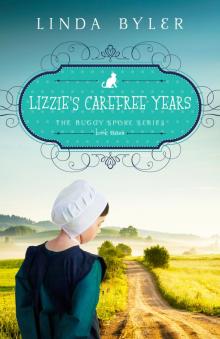 Lizzie's Carefree Years
Lizzie's Carefree Years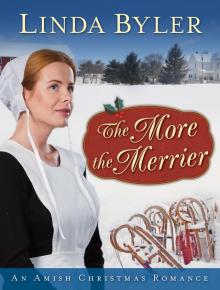 The More the Merrier
The More the Merrier Love in Unlikely Places
Love in Unlikely Places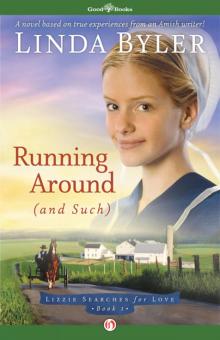 Running Around (and Such)
Running Around (and Such) Wild Horses
Wild Horses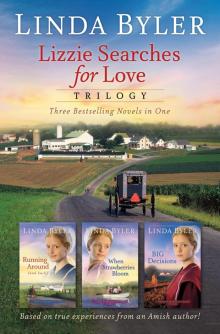 Lizzie Searches for Love Trilogy
Lizzie Searches for Love Trilogy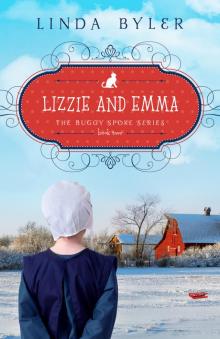 Lizzie and Emma
Lizzie and Emma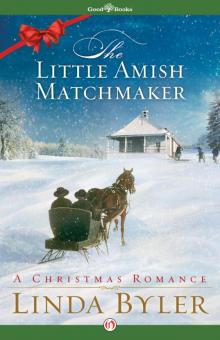 Little Amish Matchmaker
Little Amish Matchmaker The Witnesses
The Witnesses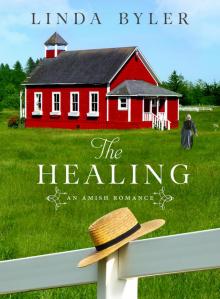 The Healing
The Healing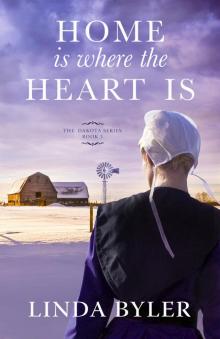 Home Is Where the Heart Is
Home Is Where the Heart Is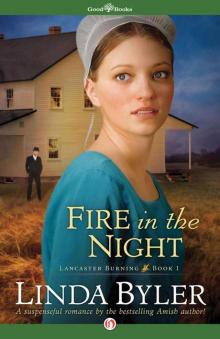 Fire in the Night
Fire in the Night When Strawberries Bloom
When Strawberries Bloom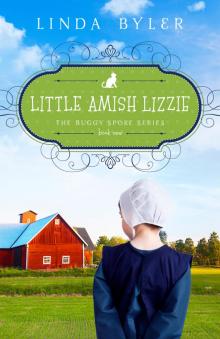 Little Amish Lizzie
Little Amish Lizzie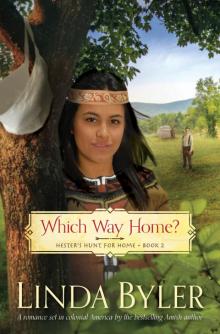 Which Way Home?
Which Way Home?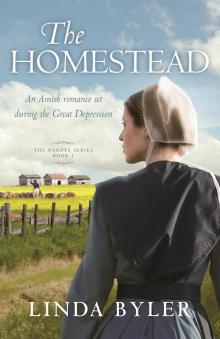 The Homestead
The Homestead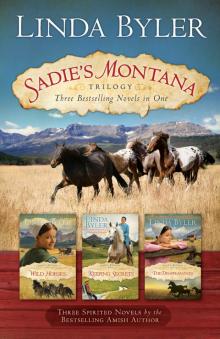 Sadie’s Montana Trilogy
Sadie’s Montana Trilogy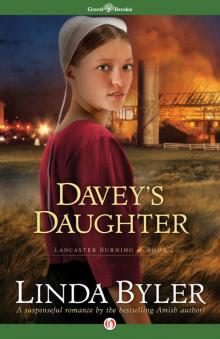 Davey's Daughter
Davey's Daughter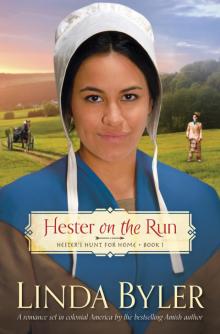 Hester on the Run
Hester on the Run Disappearances
Disappearances Big Decisions
Big Decisions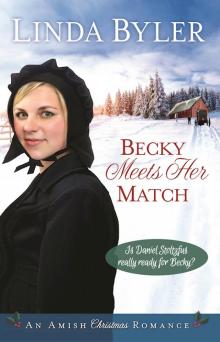 Becky Meets Her Match
Becky Meets Her Match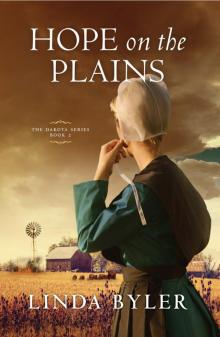 Hope on the Plains
Hope on the Plains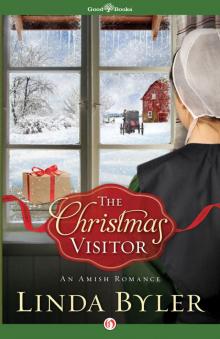 Christmas Visitor
Christmas Visitor